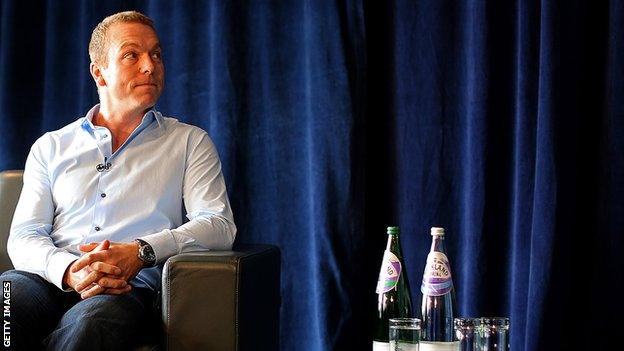Sir Chris Hoy calls for lifetime ban for drug cheats
- Published

Sir Chris Hoy has called for lifetime bans for serious doping offences in a bid to deter competitors from cheating.
Hoy told BBC Radio 5 live he found disgraced Tour de France winner Lance Armstrong's admission that he took drugs "depressing".
The Scot added: "I am a big believer in having meaningful deterrents and having lifetime bans makes people think."
Two riders were removed from this month's Giro d'Italia after failing drug tests.
French rider Sylvain Georges, 29, who rides for the AG2R team, tested positive for heptaminol, while 2007 Giro d'Italia winner Danilo Di Luca gave a positive test for EPO in an out-of-competition test.
Six-time Olympic gold medallist Hoy, who announced his retirement from international cycling in April, believes increasing checks on athletes is a positive move.
But he does not think the penalties are strong enough to remove the temptation.
He added: "It is an ugly side of the sport, of all sport.
"If the drug taken is something serious, a Class A drug like steroids or EPO or blood doping, then I think athletes should be banned for life and then they would really think seriously before doing it.
"If you can just come straight back into a team after a two-year ban, straight back to your salary and being able to earn a living, it is not really much of a deterrent.
"You could test positive in between Olympics, come back and still compete at the Olympic Games.
"Improved testing procedures and a change of culture with cyclists not accepting it and not turning a blind eye to it will also help."
Hoy is a supporter of the "whereabouts scheme" where an athlete has to notify the authorities of their location for at least one hour of the day throughout the year.
He said: "You have to be accountable and be in a certain place at a time.
"That may sound fairly trivial but in the past, in decades gone by, athletes may have disappeared to foreign countries and come back for a competition and produced amazing performances, but they would not have been tested for that period of time.
"If you could get a knock on the door at any time of the day and any time of the year that might be the difference between the cheats disappearing and doing their own thing and not taking drugs."
The Scot feels clean athletes need to act to stop drug cheats casting a shadow over their own performances.
He added: "It is frustrating because your performances get called into question as well.
"People say if you are the very best at your sport, you must be at it. There must be something you are doing.
"You think, if they could come in and see what we do day in day out, the levels we go to, the resting, what we eat, they would see everything you do is about performance.
"They would see that if you commit yourself to something for a lifetime you can do something that is amazing."
- Published28 May 2013
- Published24 May 2013
- Published15 May 2013
- Published23 April 2013
- Published18 April 2013
- Published18 April 2013
- Published20 April 2012